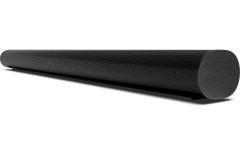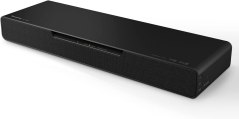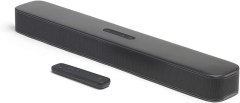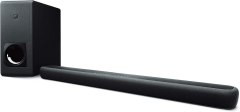BestReviews is reader-supported and may earn an affiliate commission. Details

The sleek and stylish Sonos Arc is a superb soundbar if your goal is to immerse yourself in your favorite movies, music, and video games.
Captivating 3D Dolby Atmos. Great sound quality. Easily streams audio content from a mobile device. Integrated voice controls. Available in black and white. Can use voice commands or be controlled with Apple Airplay 2 or remote control.
The Sonos Arc is a pricey soundbar.

Designed specifically for gamers; when tested by our team, this soundbar offered a gaming advantage.
Boasts crystal-clear and perfectly balanced audio; 3D sound. Easy to set up with no need for a manual. Features a simple design with very few cables and clutter. Compact design saves space.
Have to continuously change between its 3 sound modes.

Slim and designed for portability, the JBL Bar 2.0 All-in-One sports surprisingly robust audio quality for its low price.
Small footprint. Inexpensive. Deep bass. Engaging surround sound. Slim design is compact and fits easily on a TV stand. Optimized for Bluetooth and mobile music streaming. Low power usage. Easy to set up.
Only features one HDMI input.

Whether you're tech-savvy or old-school, this budget-friendly smart speaker offers impressive sound regardless of how you set it up.
Easy to use with traditional wired setup or through its simple-to-pair Bluetooth capabilities. It has a solid build and produces clear, well-balanced sound for a value price.
Bluetooth range is only about 10 feet. Volume could be louder. Remote is on the bulky side and does not come with batteries.

Based on our testing, the Ray is better than competing budget soundbars thanks to it's smaller and easy-to-setup design.
Integrates seamlessly into Sonos home system. Enjoyable, balanced sound quality with no perceptible lag even in fast-paced programs during our testing. Easy to set up, even in tight spaces. Comes with optical cable.
Not the best for cinephile-quality surround sound.

After going through an intensive research process to narrow down our short list of top products in this space, we tested Panasonic SoundSlayer Gaming Soundbar to be sure that it’s worthy of our recommendation. Guided by experts, we spend hours looking into the factors that matter and test to verify manufacturer claims.

TVs have evolved and improved by leaps and bounds over the last several years, delivering a greater number of pixels and more sophisticated image quality with each new generation. However, one thing hasn’t changed, even in the midst of the 4K revolution: the built-in speaker systems on modern TVs still sound as thin as they always did.
Thankfully, a solution exists for those who are dismayed by the thin sound of regular TV speakers: soundbars. Soundbars are thin rectangular speakers that connect to your TV and your content source, delivering much-improved audio to your space so you feel like you’re relaxing at the cinema. Soundbars easily blend with any home decor, and most can be mounted to the wall for space-saving convenience.
The soundbar market itself is rather diverse. Models range from compact soundbars that would be suitable for a college dorm room all the way to massive speakers that create a virtual surround speaker experience for large halls and gatherings. Selecting the best buy for your situation is a matter of balancing your needs with your preferred feature set. A lot of top-shelf companies make soundboards: RCA, Vizio, LG, JBL, Yamaha, Bose, and Sonos are just a handful of the reputable names. Which offering is right for you? For advice and expert commentary, continue reading this soundbar review.

Before you start looking at specific features, consider how and where you would like to use your soundbar. Start by asking yourself these questions.
Of course, you will want to make sure the soundbar you select is able to project enough volume for the room where you watch television. Smaller and less-powerful soundbars typically only contain two stereo speakers. Larger, louder soundbars tend to contain more speakers and also include a subwoofer. The number of speakers is usually noted in the product description followed by a “.1” if a subwoofer is also present. For example, a 5.1 or 7.1 soundbar has five or seven speakers inside and includes a subwoofer.
If you are a home theater aficionado, chances are you dream of owning a soundbar that is compatible with surround formats. If that is the case, make sure the product you buy supports virtual surround sound. Many of these items include up-firing speakers, which have the ability to bounce sound all around your TV room for an extravagant and delectable experience, as if you were in a cinema with strategically placed surround speakers.
Most soundbars include a subwoofer that allows them to produce rich audio with sufficient bass. Some subwoofers require a wired connection to the soundbar for this to happen. Unfortunately, such a requirement can limit your placement options. Therefore, if you can afford it, we recommend opting for a soundbar with a wireless subwoofer.




















As you shop around and compare items, keep your eyes peeled for the following high-demand features. These functionalities set the top performers apart from the rest of the crowd.
Are you debating between the purchase of a soundbar and a soundbase? If your entertainment space is small or mid-size, a soundbar would likely serve your purposes. If you require extra-big sound for some reason, however, take a look at the soundbases in your price range while shopping.

HDMI cable: AmazonBasics Braided HDMI Cable
All HDMI cables used in home theater perform essentially the same function: they carry audio and video signals between your components. That said, it is an excellent idea to get braided cable, which is more resistant to fraying and other damage. AmazonBasics’ braided HDMI cables are available in a number of lengths, and the cost is minimal.
Optical cable: AmazonBasics Digital Optical Audio Toslink Sound Bar TV Cable
If your soundbar has no HDMI port, you will need to acquire an optical cable instead. Optical cables are easy to use, but the quality of these cables can vary. We like the cables from AmazonBasics cables, which are built with high quality and last for years to come.
Cable management kit: Bestfy Cord Organizer System
After you have finished assembling your soundbar, TV, and video source setup, you will probably be left with lots of messy wires on your hands. A cord organizer is a great solution. We like this one from Bestfy because it has four sleeves, each with a zipper so you don’t have to struggle to thread your cables through.
Once you have narrowed your search down to a few models, compare the warranties that are offered with your top choices. Most soundbars include a standard one-year warranty, but some only offer 90 days of support. A shorter warranty can sometimes be indicative of a low end or inferior product.
Soundbars often go on sale during shopping events such as Prime Day, Black Friday, and the winter holiday and gift-giving season. However, you can certainly find good deals at other times of the year as well. Generally speaking, expect to pay between $50 for an entry-level budget soundbar and over $800 for a top-shelf item.
On the low end, in the $50 to $100 entry-level price range, you will find basic, often compact soundbars that are suitable for small spaces, such as a studio apartment or dormitory room. However, these smaller items will not necessarily have the oomph to power a space much larger than that. Notably, budget soundbars tend to cut a lot of corners. They often omit the inclusion of a subwoofer, or they simply do not have the volume output necessary to fill the average TV room with sound. If you need a soundbar for a temporary living situation like college or a small-scale area like a waiting room, you do not have to spend very much. However, if you are serious about elevating your TV’s audio output to the next level, we recommend you look to the next pricing tier.
In the $100 to $200 price range, you will find what we consider to be the best values in soundbars. In this mid-range, soundbars have wireless subwoofers, include key connectivity options like Bluetooth, and have enough power to fill a room with great sound without rattling the windows. If you are on a quest for a soundbar to be used in a shared space, or if you simply want a soundbar that has longevity on its side, this middle range is the price range to focus on. If you are looking for the absolute best audio quality in soundbars, however, you will need to climb one more step on the pricing ladder.
Between $200 and $800+, you will encounter high-end soundbars from trusted and reputable brand names. Soundbars in this price range undoubtedly put out great sound, but for many consumers, they can be a tough sell because you can obtain a traditional surround sound system for roughly the same amount of money. That said, the priciest soundbars are also the most impressive soundbars: they can get incredibly loud, they support high-end audio formats, and they come in slick finishes. If you are an audiophile, or if you’re searching for a soundbar that looks good enough to be a conversation piece on its own, expect to spend accordingly.

Soundbar surround sound is generally better with an eARC (enhanced audio return channel) than it is with a regular ARC. Because eARC has greater bandwidth, you get more data and therefore enjoy more cinematic sound quality. Note: you will need a high-speed cable with Ethernet to make the most of a soundbar with eARC.

A. Yes, you can do this as long as it has enough inputs. Most soundbars have multiple physical inputs, allowing you to connect to different devices. For example, most purchases include an HDMI port for connecting to a video source (like a streaming box or cable set top box) as well as a 3.5mm standard audio input jack for connecting to an Android, iPhone, or tablet. Keep in mind that some soundbars have wireless connectivity options as well, such as Bluetooth and WiFi.
A. Yes, you can do this if you want to. While many experts advise getting a soundbar that’s the same approximate width as your TV, that’s a cosmetic choice. Get a soundbar that fits under your TV, but focus more on finding one that has the right features rather than trying to find one that matches your TV.
A. Here, the term “soundstage” reflects the immersive sound quality of a soundbar. For example, if you were to close your eyes while enjoying an action film, would the high caliber of your soundbar help you discern where certain sound effects were coming from? Would you realize, say, that the footsteps of the primary antagonist were coming up behind you on your right? Of course, this would just be your perception of the film, but a quality soundbar has the width and depth to make you feel like you are actually there on the “soundstage” with the other players, living out an adventure.
Similar terms to understand are DTS Virtual:X and Dolby Atmos. DTS Virtual:X technology is designed to make the sound in your environment feel multi-dimensional even though you are listening to it through a finite set of speakers. Dolby Atmos does much the same thing, but it focuses more on the height of the sound. In fact, if you purchase a soundbar with Dolby Atmos, some experts recommend that you install ceiling speakers for maximized effect.
Get emails you’ll love.
Learn about the products you’re wondering if you should buy and get advice on using your latest purchases.
